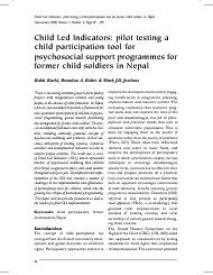Child Led Indicators: pilot testing a child participation tool for psychosocial support programmes for former child soldiers in Nepal
There is increasing attention given to participatory projects with marginalized children and young people, in the absence of child protection. In Nepal, a process was developed to provide a framework for more systematic participation of children in psychosocial programming, geared towards facilitating the reintegration for former child soldiers. The process development followed seven steps with the children, including culturally grounded concepts of psychosocial wellbeing and problems, desired outcomes, utilization of existing resources, responsive activities and development of indicators in order to monitor project activities. The result was a series of Child Led Indicators (CLI), which represented markers of psychosocial wellbeing that children prioritized, recognized in others, and could monitor throughout a project cycle. Development and implementation of the CLI tool revealed a number of challenges to the implementation and effectiveness of participatory tools for children, which echo the growing the critique of participatory programming This paper will describe the framework as well as the results of a pilot CLI implementation
Geachte bezoeker,
De informatie die u nu opvraagt, kan door psychotraumanet niet aan u worden getoond. Dit kan verschillende redenen hebben,
waarvan (bescherming van het) auteursrecht de meeste voorkomende is. Wanneer het mogelijk is om u door te verwijzen naar de bron
van deze informatie, dan ziet u hier onder een link naar die plek.
Als er geen link staat, kunt u contact opnemen met de bibliotheek,
die u verder op weg kan helpen.
Met vriendelijke groet,
Het psychotraumanet-team.
Reference:
Rohit Karki, Brandon A. Kohrt, Mark J.D. Jordans | 2009
In: Intervention: the international journal of mental health, psychosocial work and counselling in areas of armed conflict, ISSN 1571-8883 | 7 | 2 | 92-109
http://www.interventionjournal.com/sites/default/files/Karki%202009%20Intervention.pdf
In: Intervention: the international journal of mental health, psychosocial work and counselling in areas of armed conflict, ISSN 1571-8883 | 7 | 2 | 92-109
http://www.interventionjournal.com/sites/default/files/Karki%202009%20Intervention.pdf


